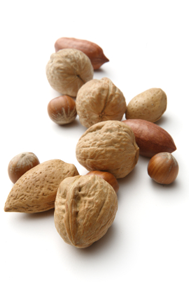Colon Health
Colon health used to be a topic that people whispered about privately, or perhaps discussed only with their doctors. Today, however, talking about the colon and its health is much more commonplace, and thankfully so.
Cleansing Naturally
In the world of natural cleansing, there is really nothing that trumps the use of fiber. According to the Institute of Medicine, women should aim for at least 20 grams of dietary fiber each day, and men should get up to 35 grams.

What is the colon?
Your colon – also known as the large intestine – is a large tube-like organ that is connected to your small intestine. About six feet in length and the shape of an inverted “U,” it runs up one side of your abdomen, across your midsection, and down the other side, where it connects to your rectum and anus. It’s called the “large intestine” because it is two to three times the width of your small intestine, an important feature that makes it capable of handling the end process of digestion and waste removal.
Role of the Colon
While most of the nutrients you get from food are absorbed in the small intestine, the large intestine is given the task of absorbing remaining fluids from feces as it moves toward evacuation. In the process, the colon absorbs sodium and various salts, discharges potassium, and is the home of between 300 and 1,000 species of microscopic bacteria, some of which produce vitamin K and biotin. These bacteria come in essentially two varieties: “friendly” and “unfriendly.” That is, some of them promote good health, while an overabundance of the others can lead to discomfort and disease.
What many people don’t know, however, is that the bacteria in your colon contribute a great deal to the condition of your immune system. In fact, some sources suggest that 70-80% of your immune system is located directly in your gut! Accordingly, it’s vital to ensure that your colon is not only clean and working properly, but that it is “housing” a good amount of the friendly bacteria that help keep your immune system strong.
Probiotics and a Healthy Colon There are two easy ways to do this. The first is to take a probiotic. This is a supplement that is specially designed to introduce more healthy bacteria to your body, which in turn diminishes the ranks of the unhealthy, putting the balance back in a positive state.
A second way to support the friendly bacteria in your colon is to feed them! You do this by ingesting foods such as whole grains, fruits, and vegetables that contain friendly bacteria-feeding fiber. Simply improving the friendly-to-unfriendly bacteria ratio in your gut can make substantial differences in your health, including improving digestive health, supporting the immune system, and restoring friendly bacteria that may have been reduced by the use of prescription medications such as antibiotics.
 egumes, nuts and seeds are sources of soluble fiber.
egumes, nuts and seeds are sources of soluble fiber.Fiber and Colon Health
Increasing your intake of dietary fiber and foods that contain good amounts of it also has the added benefit of helping regulate bowel consistency. This, in turn, has been linked to lower levels of cholesterol, reduction of heart disease, and lowered risks of obesity or becoming overweight. It’s worth noting that some people find that upping their intake of dietary fiber results in increased flatulence, also known as gas. While flatulence can be caused by many unhealthy foods that contain an abundance of sugars and starches , it is also common with a sudden increase in dietary fiber. Typically, reducing the intake of fiber and slowly increasing it over a period of a few weeks can help reduce that uncomfortable and potentially embarrassing consequence.
Be Good to Your Colon
Treating your colon well by increasing your intake of probiotics and dietary fiber is an excellent way to make an investment in both your short- and long-term health. If you suffer from digestive complaints or occasional constipation, consider taking steps to ensure that your large intestine is getting the health-preserving attention it needs.
1Colon-cancer overviews. (n.d.). University of Maryland Greenebaum Cancer Center. Retrieved April 10, 2011, from http://www.umgcc.org/gi_program/colon.htm
2 Senior, K. (2010). Friendly bacteria in the digestive system - types of bacteria. Types Of Bacteria (UK). Retrieved April 10, 2011, from http://www.typesofbacteria.co.uk/friendly-bacteria-digestive-system.html
3 Mercola, J. (2008). Probiotics found to help your gut's immune system. Natural Health Articles. Retrieved April 10, 2011
4 Fiber. (2009). University of Maryland Medical Center. Retrieved February 8, 2011
5 Intestinal gas (belching, bloating, flatulence, etc.). (n.d.). MedicineNet.com, Retrieved April 10, 2011 from http://www.medicinenet.com/intestinal_gas_belching_bloating_flatulence/page2.htm

